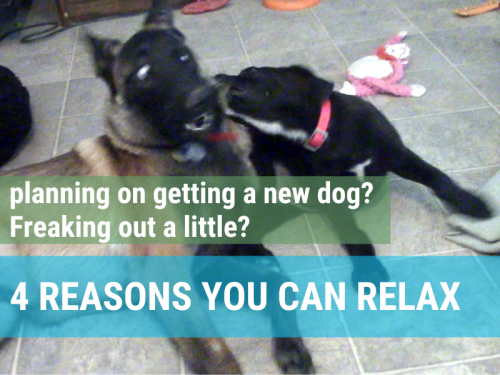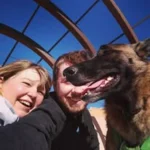Hey there, new puppy parent or puppy-parent-to-be. Let’s forget dogs for a moment and talk about you.
How ya doin’?
If you feel like…
- Your head is going to explode
- Raising a puppy might be way harder than you thought
- You have no idea where to even start
…I’m willing to bet you’ve done at least some of the following, in order to be as prepared as possible for your new pup:
- Followed a bunch of dog trainer InstaTubeTok accounts, so now your social media feed is nothing but perfectly trained dogs
- Watched every episode of The Dog Whisperer
- Been bombarded with unsolicited advice from every friend, relative, and neighbor who’s ever seen an episode of The Dog Whisperer
- Endlessly googled things like “what to do with a new puppy” (hello! Nice to meet you)
- Found a lot of content that basically says you have to “raise your puppy EXACTLY RIGHT or else they’ll be RUINED FOREVER.”
- Discovered that no two dog trainers seem to agree on what “exactly right” even means??
As a dog trainer: I’m sorry. Sorry my industry is such a labyrinth of confusing and conflicting advice. We really do mean well.
As a fellow dog owner: oh boy, I totally get it! With my first couple dogs, I went mad trying to make sense of it all. Every book I read or video I watched had a completely different dog training philosophy.
It’s a wonder I decided to pursue dog training as a career, instead of running screaming in the opposite direction.
And that was before social media was a thing. The information overload (not to mention pressure to get it right) is way worse now.
Enough of this madness.
You don’t have to feel this way. Allow me to unburden you a bit.
There are plenty of reasons NOT to panic about the puppy thing.
Here are four reasons you can relax
The way your puppy “turns out” does not rest solely on your shoulders
You’ve probably heard stuff like “it’s all in how they’re raised,” or encountered fear-mongering advice that implies that one wrong move will ruin your puppy forever.
The people who give this advice mean well, but it causes a couple problems:
- It makes dog owners feel terribly guilty if their dog develops behavior issues.
- It makes people feel like failures if they can’t get their dog to care about [training/agility/fetch/being a therapy dog/insert activity here].
Besides, it’s not even true!
Babies (human or canine) are not blank slates.
Think of the classic tale of the dad who raises his son to be a basketball star, only for that son to reject dad’s dream and embrace musical theater instead.

We are not extensions of our parents. Your puppy is not an extension of you.
Sure, there IS a lot you can do to influence your puppy’s behavior and help them become the best dog they can be. Good socialization, training, etc. We’re big believers in that stuff, and we teach it in Puppy Survival School.
But there are other factors that are out of your control. Meaning that if your dog develops behavior problems, it’s not all your fault.
Some elements of aggression, separation anxiety, and fearfulness are genetic. They can also be influenced by prenatal and neonatal environment.
The same goes for the type of activities a dog enjoys, or how easy to train they are.
I mean, that’s the whole point of breeds, right? No matter what, a border collie is going to turn out differently than a shiba inu.
A lot of the joy of puppy parenthood is found in discovering who your puppy is, not in molding them into the perfect dog.
Plus, puppies are resilient. The occasional training mistake is not going to ruin them for life.
There are no deadlines for basic obedience training
Your pup will be just fine even if you don’t teach them any commands right away.
Sit, Stay, Down, Heel, Come, Watch Me, Leave It, Jump Through A Flaming Hula Hoop… none of this is time-sensitive.
It’s not like your puppy is going to hit their first birthday and be untrainable, or wither away if they don’t learn a Sit-Stay.
Take my dog River, for instance:

When I adopted her, she was the first puppy I’d raised in a long time. So I had LOTS of ambition. I was totally going to be one of those trainers on Instagram with the four-month-old puppy prodigy.
But long story short, I got hit with a wave of depression two weeks after I brought her home. I had no energy or interest in training. So all my training projects went on hold for a while.
Five years later, River is a perfectly happy and well-adjusted dog, my little adventure buddy, and we work on new training projects from time to time.
(Still haven’t taught her a Sit-Stay. Maybe I will someday but so far it hasn’t been important)
It’s okay to slow down and take a more relaxed approach to raising your puppy.
You can just get to know them and let them settle in. Take them on little adventures and let them explore the world at their pace, while incorporating casual forms of training that teach good habits without all the pressure. We really embrace this philosophy in Puppy Survival School. (River’s whole training process was filmed and turned into convenient step-by-step tutorials in that program)
Sometimes, you’ll be unhappy. But that doesn’t mean this was a bad idea or that you’re doing anything wrong
The cultural narrative is that getting a puppy is super exciting and joyful! A fuzzy little bundle of love who wants nothing more than to be your best friend!
We get bombarded with that message our whole lives.
And then you actually get a puppy, and somewhere between day 2 and 14, you find yourself not happy at all. The sleep deprivation hits, or the puppy’s antics drive you insane.
And that’s when you think, “either something is wrong with me, or something is wrong with this puppy.”
Nothing is wrong with either one of you.
For most of us, raising a puppy is not endless joy.
This is normal.
It doesn’t mean you’re doing anything wrong, and it doesn’t mean it’s too late to have that beautiful bond you were hoping for.
Some problems are opportunities in disguise

Your dog may develop behavior issues that you didn’t expect. And you’ll get this terrible sinking feeling in your stomach.
This isn’t how this was supposed to go! Everything is ruined!
…everything is ruined, right?
It doesn’t have to be.
A lot of us who embark on these journeys with our “problem dogs” find that the experience creates an intense, close friendship like no other.
Remember River, from two seconds ago?
River turned out to be scared of her own shadow and barky toward strangers and dogs.
Welp. There went my plans for enrolling her in puppy agility class.
Instead of doing all the “fun” training I’d planned, I had to put a lot of effort into fear and reactivity work. There were sleepless nights and anxiety attacks and much negative self-talk.
But instead of ruining everything, that experience directly built the bond River and I have now.
We learned to read each other really well.
She learned that she could trust me no matter what and I would always have her back.
And, since the training methods I used involved play and adventures and snacks, she quickly decided I was a ton of fun to hang out with.
Behavior issues suck.
But if you treat them like a challenge you and your dog will work through as a team, it can give you the thing you want most: a strong bond with your very own Man’s Best Friend.
Hopefully, you’re breathing a little easier now.
And if you’d like step-by-step guidance and a judgment-free, down-to-earth support system on your adventures in dog life, come join us in the 3 Lost Dogs Academy.





